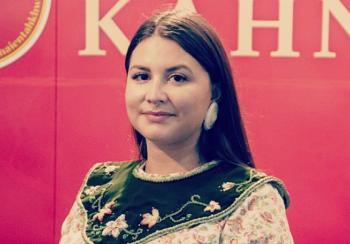Image Caption
Summary
Local Journalism Initiative Reporter
Windspeaker.com
The Mohawk Council of Kahnawà:ke (MCK) is telling the Quebec government to support Indigenous Nations in revitalizing their own languages rather than imposing “even more colonial ideologies” on that work.
Jessica Lazare, MCK’s lead portfolio chief for heritage, contends that a newly-proposed bill to revitalize Indigenous languages, which is on the agenda of Coalition Avenir Québec (CAQ) government, is a “band-aid solution”.
The bill attempts to mitigate the impacts of Bill 96, An Act respecting French, the official and common language of Québec on Indigenous peoples.
The Charter of the French Language was strengthened last year through Bill 96, despite Indigenous organizations and students marching against it and protesting it at the legislature. The bill was passed in May 2022.
Indigenous Nations asked the government to carve out an exception for them in the Act, including in education where students were required to write exams in French in order to obtain their college diplomas.
Last month, draft regulations for Bill 96 were published in the Montreal Gazette, which exempted students who reside or have resided in Indigenous communities or on reserves from having to take the French test.
“The impacts are very, very real for our people, despite the education exemption. That is just one piece of the greater picture,” said Lazare.
She recounts three recent phone calls to a hospital to make an appointment and being hung up on all three times. She said they wouldn’t speak to her in English, and she couldn’t understand their quickly spoken French.
“Since (Bill 96’s) conception, it's provided challenges for our community, specifically, and I know for other Indigenous, mainly English-speaking communities, because we have to learn French in order to succeed or to go anywhere in the greater society,” said Lazare. “That takes up the space for learning our own language, which is already at risk.”
And now, she says, with CAQ proposing a bill to protect Indigenous languages, the government is “further impeding on our rights to be able to govern ourselves, to be able to learn our language, to be able to have access to the resources for our own language,” said Lazare.
She points out that Kahnawà:ke has its own language law and although the Kanien'kehá:ka Language Law may be “a bit outdated,” it’s something the nations implemented on their own. Currently, they are reviewing how to strengthen implementation of the law.
“The Quebec government has no jurisdiction and no right to be trying to create legislation over Indigenous languages because it's up to Indigenous peoples to be taking ownership and doing that work,” said Lazare.
MCK doesn’t stand alone.
The Cree Nation Government issued a statement early last month saying it would not participate in consultations as proposed on the Indigenous language bill, instead demanding a nation-to-nation discussion as set out under the James Bay and Northern Quebec Agreement.
The Cree Nation also has its own legislation having adopted the Act respecting the Cree language of Eeyou Istchee. The act establishes an Office of the Commissioner of the Cree Language.
The Assembly of First Nations Quebec and Labrador (AFNQL) has also told Ian Lafreniere, minister for relations with First Nations and the Inuit, that Quebec chiefs oppose Quebec’s potential proposed legislation and associated consultation process.
Lazare says Lafreniere has changed the consultation sessions to dialogues now but is still pushing forward.
What Indigenous Nations need from CAQ, she says, are monetary and human resources to support Indigenous Nations’ own work.
Meanwhile, the battle against the new Act respecting French continues.
In mid-April, AFNQL joined with the First Nations Education Council to file a legal challenge with the Superior Court of Quebec regarding the Act respecting French. The judicial review is specific to 14 articles within the Charter of the French Language, which they allege infringe on Indigenous rights to self-determination and self-government in education and threaten the status of First Nations’ languages and cultures.
The judicial review will enable First Nations to have their rights heard in a court as “it is a clear demonstration that the provisions of this law infringe on the generic ancestral rights held by Aboriginal people,” reads an AFNQL press statement.
It was after the court action was initiated that Quebec registered its change in regulations for education for Indigenous students.
Lazare says while MCK is not party to the court action, they are fully supportive of it.
The Quebec government has established barriers, she says, which are both systemic and “borderline racist.”
“Language is so deeply tied to culture you can't separate the two and that's what I mean by it's borderline racist because they're still imposing all of these different barriers on to our people,” said Lazare.
MCK will wait to see the bill the province develops for supporting the revitalization of Indigenous languages and “then we’ll take it apart,” says Lazare.
Never miss a Windspeaker article. Subscribe Today to our new Windspeaker Newsletter!
Local Journalism Initiative Reporters are supported by a financial contribution made by the Government of Canada.

